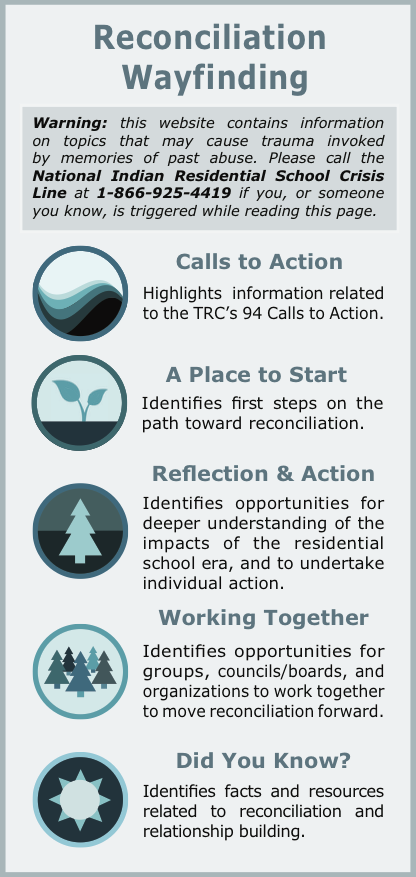Calls & Pathways to Action
The Truth and Reconciliation Commission of Canada (TRC) released a summary report, Honouring the Truth, Reconciling for the Future, in June 2015. The report makes 94 Calls to Action, proposing concrete steps to protect child welfare, preserve language and culture, promote legal equity and strengthen information on missing children. In the report, the Commissioners specifically ask the Government of Canada to implement the United Nations Declaration on the Rights of Indigenous Peoples (UNDRIP), while urging all orders of government to work to eliminate educational and health outcome gaps between Aboriginal and non-Aboriginal people in Canada. Also emphasized is the need to educate students, professionals, and newcomers about Indian Residential Schools and their impacts on all people living in Canada.
Of the 94 calls to action, 16 focus on local and/or all orders of government. These 16 predominantly focus on areas of federal and provincial jurisdiction, although local governments may play important supporting roles. Local governments may also consider working towards reconciliation through an emphasis on relationship building and education, detailed further below.
Reconciliation Opportunities for Local Governments
UBCM's Commitment
The TRC's Calls to Action represent a catalyst for change in Canada. As an organization that supports relationship building between First Nations and local governments, UBCM recognizes that it has a role in the ongoing reconciliation journey.
UBCM began to promote the work and the reconciliation message of the Truth and Reconciliation Commission of Canada (TRC) in 2013. UBCM did so by working with Reconciliation Canada, an Indigenous-led organization promoting reconciliation by engaging Canadians in dialogue that revitalizes relationships between Indigenous peoples and all Canadians.
This work spurred UBCM on to further engagement with projects and advocacy that aim to move reconciliation forward. These initiatives provide opportunities for local governments, in their own communities, to begin or strengthen reconciliation with Indigenous people.
For more information, see: UBCM work to advance reconciliation.
Additional Context
UBCIC Urges Local Governments to Stand with Survivors
At the Province-wide Community to Community Forum on September 16, 2024, UBCM members learned about the facts and findings of the Truth and Reconciliation Commission, the impacts of residential schools and the missing children and unmarked burials. Union of BC Indian Chiefs is urging local governments to uphold the experiences of survivors and the TRC’s findings, to implement the TRC’s Calls to Action and to support survivors. To learn more about UBCIC’s resolution, read their letter to municipalities with a copy of the resolution. The resolution can also be found on the UBCIC website.
Assimilationist Government Policies
For over a century, the Canadian government adopted policies with a central goal of assimilating Aboriginal peoples and stripping away Indigenous consciousness. Backed by these assimilationist policies, the government removed many First Nation, Métis and Inuit children from their families—some forcibly—and placed the children in Indian Residential Schools. These schools were church- or state-run institutions where over 150,000 Aboriginal children were forbidden to express their culture, practice traditions or speak their first languages. Children placed in Indian Residential Schools often experienced mental, physical or sexual abuse by teachers, administrators or school staff. The last Indian Residential Schools closed in the 1990s.
Truth and Reconciliation Commission of Canada
For decades, survivors sought official recognition and redress for their forced experiences in Indian Residential Schools. In 2006, Indigenous peoples and the federal government signed the Indian Residential Schools Settlement Agreement, which in part established the Truth and Reconciliation Commission of Canada. The TRC’s mandate was to listen, learn, and educate all Canadians about what took place in Indian Residential Schools. It sought to hear and document the truth as told by survivors, families, communities and anyone personally affected by the experience. Starting in 2009, three TRC Commissioners heard more than 6,750 survivor and witness statements from across the country about the lasting legacies that Indian Residential Schools have had on their lives.
All materials gathered, recorded, and produced by the TRC have been transferred to the National Centre for Truth and Reconciliation, a permanent repository that will provide stewardship and facilitate access to the materials.

